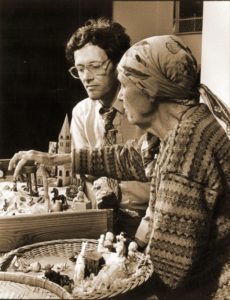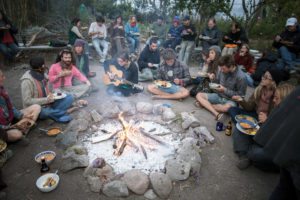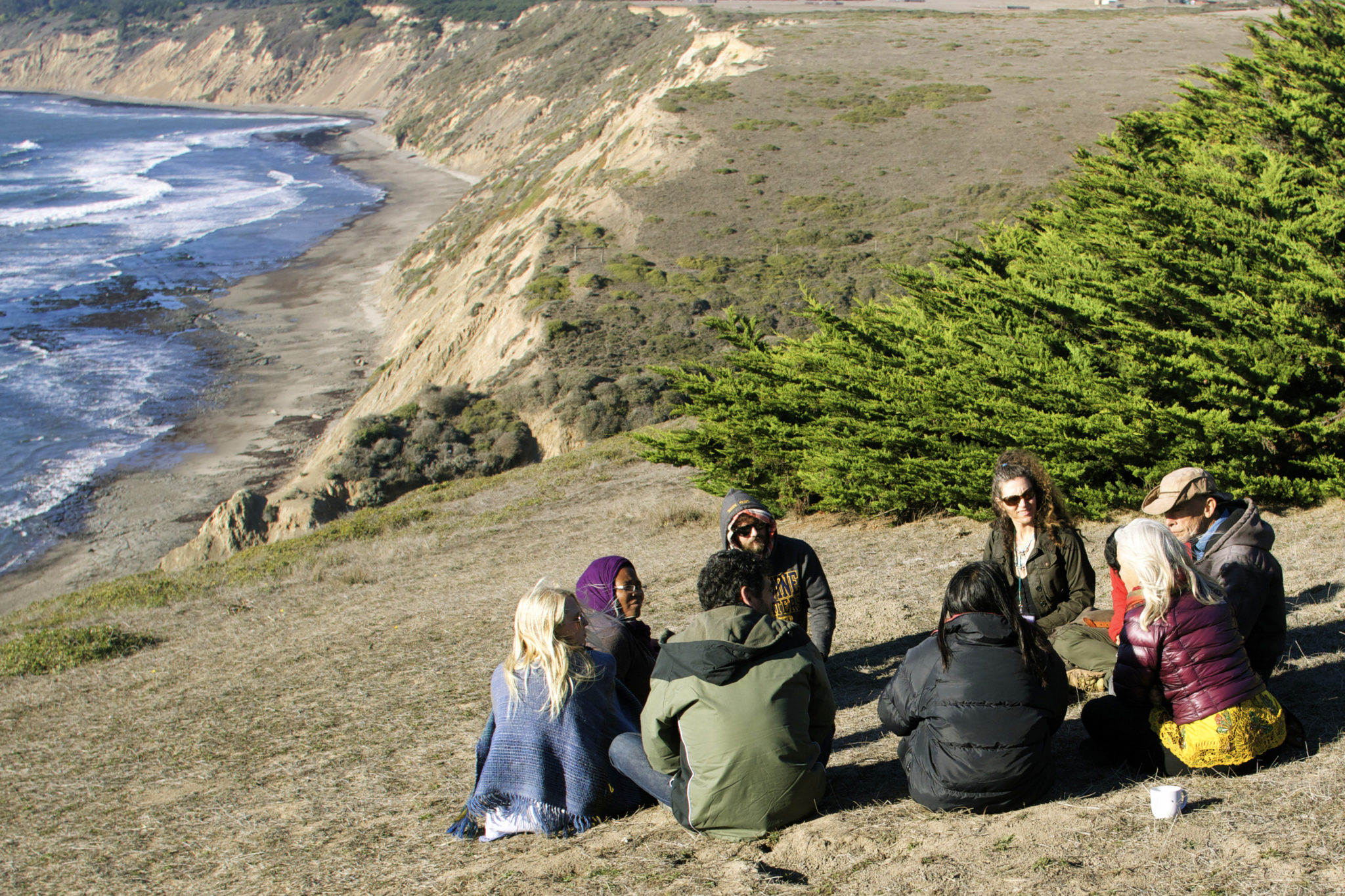By David Templeton
Four full decades ago, an idealistic Harvard psychology grad named Michael Lerner was walking along the shore in Bolinas, when he noticed a mysterious gray building. It was the one-time RCA transmitter site, perched like a concrete monolith on a bluff overlooking the ocean. It was a moment that would change Lerner’s life, and would eventually alter the lives of thousands of people all over the world.
Having taught psychology and political science at Yale before moving to Marin to found Full Circle—a residential treatment center for children with learning disorders—the 32-year-old Lerner had become interested in how nutrition could benefit young people incarcerated in the juvenile justice system. He was keenly aware that the world was in need of healing on a massive scale.
It would be a big job, one he very much wanted to be a part of.
When he saw that large old concrete building, he somehow recognized, in an instant, that it could, and should, become the headquarters of a new kind of community, one that would take cues from all the leading areas of science, psychology, agriculture, art and … whatever else might come along.
That was 1975.
This year, Commonweal—the remarkable nonprofit organization that sprung in 1976 from that moment of inspiration—turns 40 years old. Three weeks ago, a huge celebration took place at Commonweal, honoring the work of thousands of dreamers and thinkers who, over the years, have worked side-by-side to turn the once-abandoned site into one of the most significant cutting-edge educational centers in America.
“The founding vision of Commonweal, 40 years ago, really did take place as I was walking along the edge of the Bolinas mesa,” recalls Lerner, calling from a conference in New York City.
“I had a true vision that this old RCA transmitter site could become a place of healing for ourselves and for the Earth. It was a very powerful moment. I was in my early 30s, so I was young enough and crazy enough to believe that that vision was possible.”
Lerner quickly took his still-forming idea to a pair of friends and colleagues: The conservationist Burr Heneman, and childcare advocate Carolyn Brown. One look at the site, rising from the mist at the edge of Pt. Reyes National Seashore, and they were infected by the vision as well.
Immediately, the threesome began planning.
“That’s how it all started,” Lerner says. “The three of us joined together and, by some grace, Commonweal came into being. And though the details have changed, it’s remained remarkably true to our original insights. We imagined doing important research and advocacy projects. We imagined a beautiful retreat center, with a biodynamic garden. That’s all happened. We’ve created a center where we can do service and research in health and human ecology. And it’s all been sustained.”
Not that it’s been easy.
By the early 1980s, Commonweal was thriving. The work being done there had captured the imagination of dozens of scientists, artists and philosophers who came together in Bolinas to ask hard questions about the condition of the world, and to devise programs to test out a variety of possible answers. With Lerner serving as executive director, the organization was employing 40 people, and had built an international reputation. Ideas were on the table to take Commonweal well into the 21st century.
Then, about eight years into the project, Commonweal suffered a major financial crisis. Nearly all of its funding sources—including the San Francisco Foundation and CETA (the Comprehensive Employment and Training Act)—suddenly collapsed. It was, Lerner recalls, one of the most difficult periods of his life, made more complicated by the recent death of his father, and the dissolution of his marriage. What got him through it, personally, he now says, was his discovery of yoga, a practice he continues to this day.
“After I discovered yoga, everything changed for me,” Lerner says. “I began to reconceive how to do Commonweal—not as an institution, with fixed programs, but as a human service, one that could evolve and change constantly.” Instead of continuing to follow a typical organizational model in which the ideas and programs all came from the leaders and staff, Lerner says he began to see a different way. “Our programs,” he says, “would be the fruit of an array of visionary program directors, people doing important work, who we would invite to come out and join us at Commonweal.”
Lerner was convinced that such a model would work. But first, Commonweal needed to find a way to remain operational, and it’s future was still very much in doubt.
“We’d always hung on by a thread, financially,” Lerner acknowledges, “but I had never imagined a time when I would have to lay off 40 people—including myself. I stayed on without pay, but we laid off everyone else but a receptionist and our business manager. There was a point where the board asked me to stand aside and have the BM become our Exec Director, and I basically said, ‘OK! Tell me what corner to stand in.’ I was too stupid or stubborn to know that I should stop,” he says. “Then, one day in the midst of this crisis, I got a phone call saying I’d just won a MacArthur Foundation Fellowship.”
Commonly known as the MacArthur “genius grants,” the prestigious fellowship program—established by the MacArthur Foundation in 1981, just three years before Lerner got the life-changing call—is an annual program in which 15-to-20 individuals, mainly artists, writers and scientists, are awarded major cash grants

to continue their work. In addition to the money—then close to half-a-million dollars—the award comes with a certain degree of public attention, and whatever benefits accompany being so publicly named a “genius.”
It turned the tide at Commonweal, right at the moment Lerner was beginning to believe he should perhaps move his life in a different direction.
“If I’ve given something my best effort and the universe has other plans, I am authentically going to recognize whatever the universe has in mind, whether it’s what I hoped for or not what I hoped for,” he says. “I think my willingness to recognize the truth of reality, and try to align myself with that—even if it’s moving me in very different directions—means I can always keep looking for new opportunities to serve.”
But instead of moving on, Lerner now had the opportunity to stay, and to expand on Commonweal’s original vision.
“After the MacArthur grant, the energy began to flow back to Commonweal,” Lerner says. “Suddenly, all was forgiven. In the end, I had more authority than I’d had previously, though it came at a time when I was shifting my views about what that meant. Commonweal, to be honest, is about so much more than me. From the start, it has always been a collaborative project. It’s always been about the work. It’s about the people who do their work here. And it’s about the people who benefit from that work.”
If the proof is in the pudding, as they say, the reenergized Commonweal has certainly proven itself, with a long list of remarkable successes.
“Our ocean policy program basically rewrote the laws of California fisheries,” Lerner says. “Commonweal’s New School has quickly become a powerful model of adult collaborative learning. Our Cancer Help Program is widely regarded as the best residential support for people with cancer in the U.S.”
The list goes on and on.
“And other new programs come in all the time,” he continues. “That’s important. New programs. New people. New ideas. That creates a constant sense of vitality and renewal.”
“The work Commonweal does is, in one way, very humble and quiet, and in another way, very innovative and exciting,” says Oren Slozberg, chief strategies officer for Commonweal, and a world-renowned expert in what is now called “Visual Thinking Strategies,” a program he’s brought to Commonweal, which Lerner still leads, and which is still considered one of the primary centers of alternative education and research in the world.
“Visual Thinking Strategies,” Slozberg goes on, “is a way of using visual art to build critical thinking, empathy and communication.”
Also known as VTS, Visual Thinking Strategies is a concept in which—through teacher-facilitated discussions of art, photography and other images—participants gradually build their abilities to identify and empathize with other human beings. It’s one of many current ideas and approaches to learning that Commonweal has adopted over the last few decades.
It’s numerous art programs include Gift of Compassion, using sculpture, photography and portraiture to help the recently incarcerated and other underserved communities, by employing meditation and deep contemplation to bring adults and youth a sense of clarity and personal responsibility.
A major part of Commonweal’s work deals with alternative cancer therapies, and as such is doing work that has affected lives of thousands of individuals. A glimpse of the institution’s website reveals dozens of interests and pursuits, ranging from the familiar (justice, law, nature) to the less familiar (bio-monitoring, regenerative design, Fun Ni Myo Do: The mysterious path of Not Two). Commonweal’s current breadth of work is stunningly expansive.
That’s part of what attracted Slozberg, who admits that he had reservations about hiring on with an organization that was then almost 40 years old. Many nonprofits become stiff after so long, locked in a rigor-mortis death grip of we-don’t-do-it-that-way. When the previous chief strategies officer, Susan Braun, left Commonweal to become executive director at the V Foundation—specifically focused on cancer research—Lerner approached Slozberg with a tantalizing offer.
“Michael invited me to come and join him here to help envision where the Commonweal community is going in the next generation,” Slozberg says. “A lot has changed since 1976, and Commonweal is now a very nimble

entity. It has adapted with time, and intends to continue adapting with time. So now, as we’re looking toward a new generation, we’re going to need to explore what Commonweal’s next incarnation is going to look like. I look forward to being a part of that process.”
Slozberg admits that stepping into a leadership position at Commonweal was not a decision he took lightly.
“Commonweal,” he says, “is structured in such a way that it responds to what the needs of the times are. As people who live in those times come up with new ideas, new programs, new visions, well, Commonweal is the perfect place for those ideas to take root and grow. It’s like a very fertile garden that different plants grow in, and we all share the same soil, and we’re all nourished by the same rain, but each plant looks different and does different things.
“Commonweal’s diversity of programs and projects is what allows us to remain so fresh and alive. I don’t think anyone could have fully envisioned, 40 years ago, what Commonweal has become today. I don’t think anyone could have predicted what we’re doing now, 10 years ago or even five years ago. The work being done here, the research being worked on here, is all work that, to some degree, wasn’t even being dreamed of at the beginning.”
Because the world always changes, Commonweal, by design, changes with it.
“Think about it, “Slozberg says. “Forty years ago, when Michael started this organization, he was mainly looking at young people in the juvenile justice system, and how nutrition might be part of providing something that would improve their lives. That was state-of-the art thinking. And 25 years ago, when Commonweal was looking at medical education and thinking about how to work with 23-year-old medical students who were going to be working with life-and-death issues in a bureaucratic and heavily administrative system … that was new thinking, too. Each generation has different questions and different problems, different visionaries and different visions.“And Commonweal,” he says, “is the place that can hold all of that.”
For Lerner, it ultimately all comes down to maintaining an attitude of compassion for others and hope for the future. And that, he says, is not always as simple as it sounds.
“One of the great challenges we face right now is the challenge to democracy,” he says. “We’ve had a long run, where democracy was ascendant. But right now, democracy is being assaulted by tremendous corporate overreach in terms of trade agreements that would trump all local state and national laws. Also, the failure of democracy to really deliver, in terms of people’s needs, and also in terms of people’s health and the environment.
“The recent challenges to democracy that we’ve seen, and all that it means to our future, is one of the most fundamental challenges we have ever seen in this country. But through the work we’re doing at Commonweal, and the connections we are making across the planet, I have an authentic hope that we can somehow find a way to come together, and work together—not just here in the U.S., but all across the world.”
Asked how Commonweal is set up to continue doing that work after his own life is over, he again points out that Commonweal is, above all else, a community.
“The deepest lineage is not associated with a particular organizational structure, which tend to come and go,” he says. “There are always new generations with a deep commitment to the service to life, in some way. We are in a period of such rapid global transformation, and Commonweal, should it continue—and I certainly believe it will—will be a living response to whatever the challenges are at that time. The point is to create a collaborative space where people who want to be of service to each other can do that.”
That said, Lerner does not plan on going anywhere anytime soon.
“I think constitutionally, I was born for heavy-weather sailing,” he says, with a hint of a laugh. “When 911 happened, as I watched the building in flames, I had a strange sense of having, for whatever reason, been born for these times. Vaclav Havel has a saying. He said, ‘Hope is definitely not the same thing as optimism. It is not the conviction that something will turn out well, but the certainty that something makes sense, regardless of how it turns out.’
“Hope,” Lerner continues, “is not a feeling, but a deep orientation of the human soul. I’ve worked with cancer patients for many years. It’s very difficult to be optimistic with metastatic cancer, but it’s very useful to be hopeful, because in dark times, hopefulness gives us energy for the fight.
“My hope,” he says, “is that Commonweal continues to serve the world for a very long time.”






